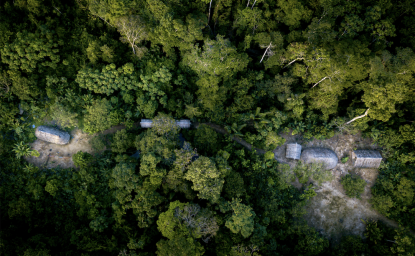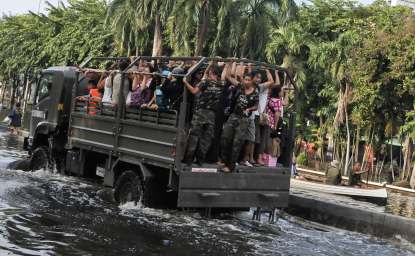 The Philippines' rapidly rising population has overwhelmed the fisheries that have traditionally supported the country, bringing grinding poverty and malnutrition to many coastal communities. But a new approach to conservation may save families along with the fish and their habitats, say Joan Castro and Leona D'Agnes in the latest issue of FOCUS. By integrating the delivery of family planning and conservation services, the Integrated Population and Coastal Resource Management (IPOPCORM) project found that it could improve
The Philippines' rapidly rising population has overwhelmed the fisheries that have traditionally supported the country, bringing grinding poverty and malnutrition to many coastal communities. But a new approach to conservation may save families along with the fish and their habitats, say Joan Castro and Leona D'Agnes in the latest issue of FOCUS. By integrating the delivery of family planning and conservation services, the Integrated Population and Coastal Resource Management (IPOPCORM) project found that it could improve  reproductive health and coastal resource management more than programs that focused exclusively on reproductive health or the environment—and at a lower total cost.
reproductive health and coastal resource management more than programs that focused exclusively on reproductive health or the environment—and at a lower total cost.
In a recent podcast interview, IPOPCORM manager Joan Castro of PATH Foundation Philippines, Inc., told Environmental Change and Security Program (ECSP) Editor Meaghan Parker that integrated programs create more sustainable environmental gains and improve quality of life: "The people are coming to realize that if they take care of their environment and they take care of the families, it is beneficial for the household, for the individual, for the community, and the future of their children."
According to Castro, the time is right for promoting integrated approaches: "The beauty of integration is that you can bring the message home: Food security is a message close to the heart of the people. Family planning is a tool to address food security; management of coastal resources is a tool to ensure food security."
 In March 2008, more than 300 people gathered in Tagaytay City, Philippines, for "Scaling Up PHE," the Third National Population-Health-Environment (PHE) Conference, which was supported by the David and Lucile Packard Foundation, Conservation International-Philippines, and the Population Reference Bureau. Building on the successes of the 2004 and 2006 conferences, the participants explored ways to expand successful programs from the community to the regional and national levels. Panels and workshops focused on sharing best practices for scaling up, developing monitoring and evaluation (M&E) indicators, and creating regional data profiles.
In March 2008, more than 300 people gathered in Tagaytay City, Philippines, for "Scaling Up PHE," the Third National Population-Health-Environment (PHE) Conference, which was supported by the David and Lucile Packard Foundation, Conservation International-Philippines, and the Population Reference Bureau. Building on the successes of the 2004 and 2006 conferences, the participants explored ways to expand successful programs from the community to the regional and national levels. Panels and workshops focused on sharing best practices for scaling up, developing monitoring and evaluation (M&E) indicators, and creating regional data profiles.
 With a group cheer of "One, two, three, scale up!" the participants committed to the Tagaytay Challenge, which includes the charge to expand and diversify PHE networks. To that end, ECSP has launched the new PHE Policy & Practice Listserv, which is open to anyone working on PHE issues around the world, including field practitioners, policymakers, advocates, and researchers.
With a group cheer of "One, two, three, scale up!" the participants committed to the Tagaytay Challenge, which includes the charge to expand and diversify PHE networks. To that end, ECSP has launched the new PHE Policy & Practice Listserv, which is open to anyone working on PHE issues around the world, including field practitioners, policymakers, advocates, and researchers.
Other new networks include the East Africa PHE Network, which emerged from the November 2007 conference in Addis Ababa, Ethiopia, and is modeled on the Philippines PHE Network. Representatives of PHE programs in Kenya, Ethiopia, Nepal, and India attended the Tagaytay conference to draw on the lessons learned from the Philippines' successful experiences.
Related Links



